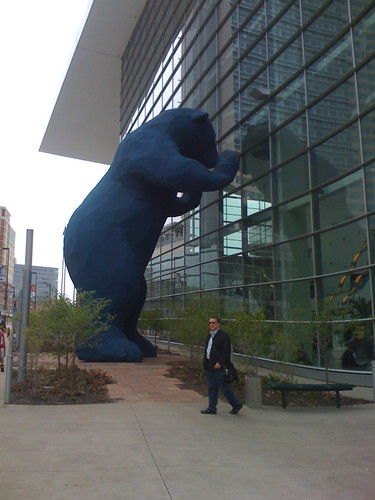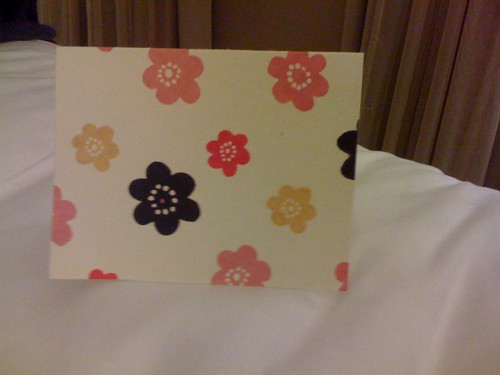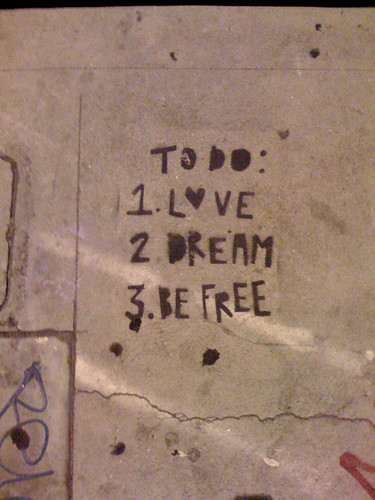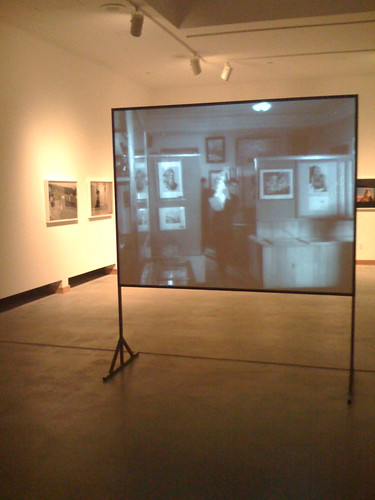A possibly new ongoing series, I will take photos of Travis Miller’s whiteboard without context for public speculation about what he is teaching. You are encouraged to make guesses in the comments below.

A possibly new ongoing series, I will take photos of Travis Miller’s whiteboard without context for public speculation about what he is teaching. You are encouraged to make guesses in the comments below.

I’ve embedded my slides for my AERA presentation, “Can You Hear Me Now?: Student Voice in the Battle For Cell Phone Use in a Less Than Receptive School” below. I’ve reused some of these slides for various presentations at this point and I feel ready to retire most of this for something newer on the next go around.
I will make the paper that Rema Reynolds and I have authored for our presentation, “Hip-Hop ‘Hypocrisy’: New Teacher Perceptions of Critical Pedagogy and Student Experiences in ‘Critical’ Classrooms” available here soon.
Also, I wanted to share a couple of pep talks from the Council of Youth Research below. The first is from Manual Arts High School senior, Gaby Dominguez and the second from UCLA Education Professor Ernest Morrell. Enjoy.
Gaby Dominguez Gives A Pep Talk from Antero Garcia on Vimeo.
Ernest Morrell Speaks to the Council of Youth Research from Antero Garcia on Vimeo.
Three context-free, AERA-related images:



[I’m trying to do my best to lay low at AERA this year; it’s too cold for my frail SoCal disposition and I’m too in need of serious focus time for quals in T-Minus one week. That being said, with four presentations and receptions and general networking, I’m sure I’ll have my fair share of AERA critique to share at some point (as I’ve had in years past).]

Heading out to Denver for AERA tomorrow. I want to especially encourage anyone to attend the interactive symposium listed above. Detailing the work of the UCLA IDEA Council of Youth Research, the symposium highlights the research of more than 30 Los Angeles High School students that I’ve helped work with. The students – as well as Ernest Morrell, John Rogers, our group of graduate student researchers, and a handful of incredible teachers – will also present on Saturday at the following session:
Youth Research and Advocacy for Educational Justice: Actions for Achievement and Change
Scheduled Time: Sat, May 1 – 4:05pm – 6:05pm Building/Room: Colorado Convention Center / Room 404
Abstract
This interactive symposium, featuring university faculty, graduate students, high school teachers, and high school students, tackles the following questions: 1. How does the presence of high school youth in the project of educational research transform conversations about educational reform? 2. How does the practice of participating in participatory research shape youth’s attitudes toward civic engagement? In the first part of this symposium faculty and graduate students will describe the project and analyze the importance of youth research to the project of urban school reform. The second portion of the session will feature current high school students and their teachers explaining their research and their efforts to utilize their research to enact school reform at the local, district, and state levels.
In addition to the two sessions related to the Council of Youth Research, I’ll also be presenting at the following two sessions:
Teaching Pedagogy and the Experiences of Children of Color
Scheduled Time: Fri, Apr 30 – 12:00pm – 1:30pm Building/Room: Colorado Convention Center / Room 603
Paper Title:
Hip-Hop “Hipocrisy”: New Teacher Perceptions of Critical Pedagogy and Student Experiences in “Critical” Classrooms
Rema Ella Reynolds & Antero Garcia
Abstract
This study focuses on new teacher perceptions of critical pedagogy and attempts to integrate issues of resistance and social justice within secondary public school classrooms. Student perceptions of their teachers, student academic achievement, and the ineffective use of popular cultural literacies, revealed that teachers’ motives and desired student outcomes are not as closely tied to academic success as they are to teacher popularity. Deficit thinking articulated in teacher expectations may leave students ill-prepared for life after school. Teacher education programs can often leave teachers unequipped with the skills necessary to simultaneously develop skilled, competitive, college-going graduates equipped multiple literacies. This paper concludes with suggestions for praxis and pedagogy as it relates to teacher education programs.
and
Praxis and Problem-Posing Pedagogy: Utilizing Critical Theory as a Transformative Tool in Urban Schools Across Disciplines
Scheduled Time: Sun, May 2 – 12:25pm – 1:55pm Building/Room: Colorado Convention Center / Room 706
Session Participants
“Man, I Am Somebody”: Exploring the Effects of Black Feminist Pedagogical Practices on African American Female Students in a High School Literature Class *Monique Lane (University of California – Los Angeles) Una Estrofa Mágica: Décima Poetry as a Vehicle Toward Meaning Making and Educating the Self *Karisa Jessica Peer (University of California – Los Angeles) “Can You Hear Me Now?” Student Voice in the Battle for Cell Phone Use in a Less Than Receptive School *Antero Garcia Education in Crisis: Civic Learning Opportunities in Times of Political and Economic Turmoil *Nicole Mirra (University of California – Los Angeles) Discussant: Ernest D. Morrell (University of California – Los Angeles) Chair: Nicole Mirra (University of California – Los Angeles) Abstract
This session highlights research that applies critical social theories (i.e. Black feminist theory, LatCrit, critical literacy, and critical civics) to the urban classroom context in order to facilitate the empowerment of students of color. Through focusing on praxis, this panel pushes both classroom practice and social theorizing in new directions that directly benefit educators and students in urban public schools and contribute to a more complex understanding of how race, class, gender, and immigration status influence learning. By providing case studies of curricular interventions, the papers in this session seek to privilege student voices and use them to push the conversation between theorists, researchers, and educators forward in the service of students often marginalized by the public education system.
If you are going to be at AERA, it would be nice to get in touch.
(Does anybody know what hashtag AERA will be using?)

In the past couple of weeks I’ve gotten several emails from friends and colleagues interested in pursuing a Ph.D. While I’m still very much in the midst (perhaps in the trenches) of my current academic program, I thought it might be useful to share my thoughts about the program, undergoing the graduate study while still teaching and answering miscellaneous questions at large. I do this in the hopes that it may be useful to other prospective teachers/doctoral students. The information below may sound simplistic or less than insightful – I’m trying to pin down the basic information I regularly get asked about the studies I am involved in (obviously, this may not be a post for general readers’ interest). If there are other questions that you would like to see addressed or explained in further detail, please throw in a comment below and I’ll update this post.

Haunting a new favorite place in the city, I found the above stenciled art a useful reminder about priorities and usage of time. As I type this, an ever-growing pile of articles and books teeters menacingly to my left. To my right, a stack of fellowship, grant, and conference forms & applications in varying states of duress meander from couch to floor. Sadie snores bemusedly in the corner as I riffle through one pile then another. My computer screen is a personified Jackson Pollock splash of awaiting-reply emails and tabbed-to-infinity Safari windows. And I guess this is the ocean I’ve been lost in for the past few weeks as I’ve been off-track from teaching duties at Manual Arts. Catching breath and wandering outside, it was useful to be challenged by a simple, quickly sprayed stencil. Having recently seen Banksy’s film, Exit Through the Gift Shop, I would argue that such a specimen is demonstrative of art’s ability to better the day-to-day lived experience of those it interacts with, regardless of medium or location.
[I’m again pondering the above as well for lessons of borders and space and classroom discourse, though not ready to jump into such a substantive rant quite yet.]

Had to snap a picture of one of my student’s homemade wallet. Fashioned out of duct tape with a handwritten quote from Sophocles to top it off (“One word frees us of all the weight and pain of life: That word is love.”). Updates to follow soon.
Actual updates will be here shortly. In the meantime, the Black Cloud is featured on the Buckminster Fuller Challenge site today. Please check it out. (Aclima is shortlisted as a semi-finalist for the BFI Challenge Award this year. The winner will be announced in June.)

[If you would like a PDF of the above info to distribute, it is available here.]

Every poem that works as a poem is original. And original has two meanings: it means a return to the origin, the first which engendered everything that followed; and it means that which has never occurred before. In poetry, and in poetry alone, the two senses are united in a way that they are no longer contradictory. – John Berger